Introduction
Winter can be a magical season with snowflakes, cozy sweaters, and hot cocoa by the fire. But it also brings a host of challenges for your skin. The cold air, low humidity, and indoor heating can strip your skin of its natural moisture, leaving it dry, flaky, and dull. If this sounds familiar, don’t worry—you’re not alone! Let’s dive into some winter skincare tips to help you combat the season’s harsh effects and keep your skin soft, hydrated, and glowing.
Table of Contents
1. Why Does Winter Affect Your Skin?
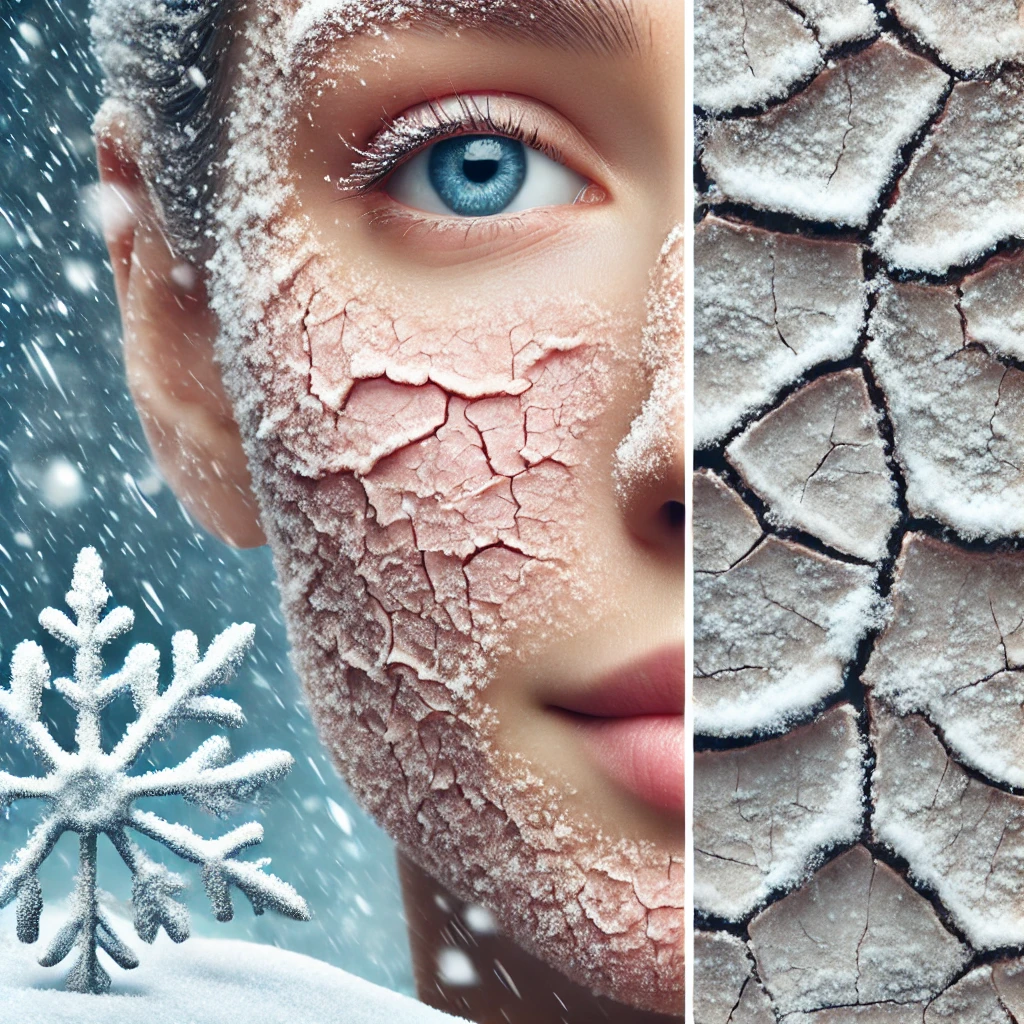
Have you ever noticed how your skin feels tighter and drier as the temperatures drop? Winter weather affects your skin in several ways. The primary culprits are low humidity, cold air, and indoor heating. Together, they create an environment that strips moisture from your skin.
When the humidity drops, the air pulls water from your skin’s outer layer, leaving it dry and vulnerable. Add freezing winds to the mix, and it’s like your skin is battling against the elements every time you step outside. Indoors, things aren’t much better. Heaters warm the room but dry out the air, making it hard for your skin to retain moisture.
Think of your skin as a shield—when it’s well-moisturized, it’s strong and resilient. But during winter, the shield gets cracks, leading to dryness, flaking, and irritation. Understanding these effects is the first step to protecting your skin during the colder months.
2. Understand Your Skin Type
Before you start updating your winter skincare routine, it’s important to know your skin type. Why? Because the products and techniques that work wonders for one person might not work for another.
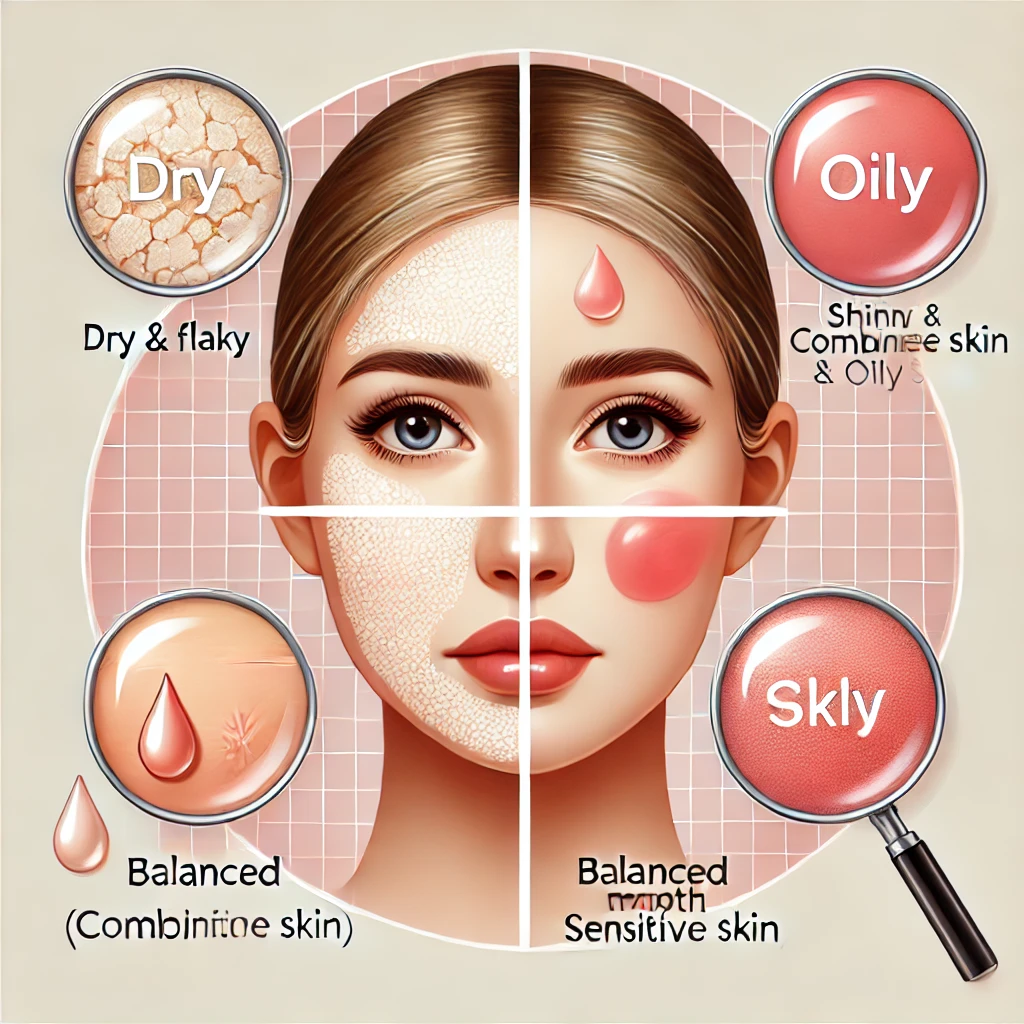
Here’s a quick guide:
- Dry Skin: Feels tight, may flake, and often looks dull. In winter, dryness can worsen, leading to more pronounced flakiness and discomfort.
- Oily Skin: Produces excess oil but may still feel dehydrated in winter. Yes, oily skin needs hydration too!
- Combination Skin: A mix of oily and dry areas, typically an oily T-zone and dry cheeks. Winter can make the dry areas even more noticeable.
- Sensitive Skin: Easily irritated, prone to redness and discomfort. Cold weather can exacerbate sensitivity.
Understanding your skin type allows you to choose products that cater to your specific needs. For example, someone with dry skin might need a heavy, cream-based moisturizer, while someone with oily skin may benefit from lightweight hydrating gels. If you’re unsure of your skin type, consult a dermatologist or try a simple test: cleanse your face, wait an hour, and observe how your skin feels without any products.
3. The Importance of Hydration
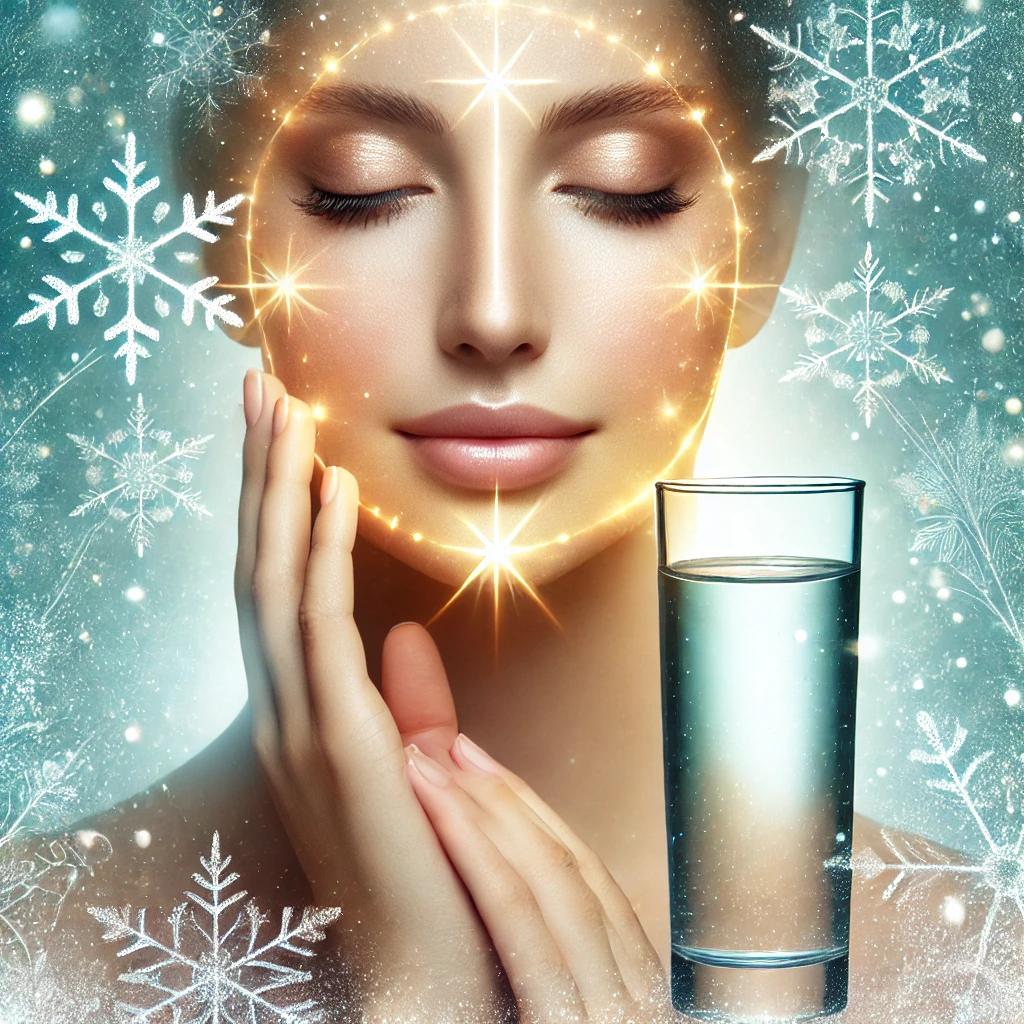
When the air gets colder and drier, hydration becomes your skin’s best friend. Without enough water, your skin can’t maintain its natural barrier, leading to dryness, redness, and even fine lines. So, how do you keep your skin hydrated in winter?
Start from within. Drinking plenty of water is crucial, even if you’re not sweating as much as you do in summer. Warm beverages like herbal teas or water infused with lemon can make staying hydrated more appealing on chilly days.
But hydration doesn’t stop there—it’s also about locking in moisture on the surface. Use hydrating products like serums with hyaluronic acid, which acts like a sponge to retain water in your skin. Think of it as giving your skin a refreshing drink. Seal it in with a moisturizer to ensure that hydration doesn’t evaporate into the dry winter air.
4. Choose the Right Moisturizer
Not all moisturizers are created equal, especially when it comes to winter skincare. Your summer favorite may not cut it in colder months. The right moisturizer acts as a barrier, preventing water loss while nourishing your skin.
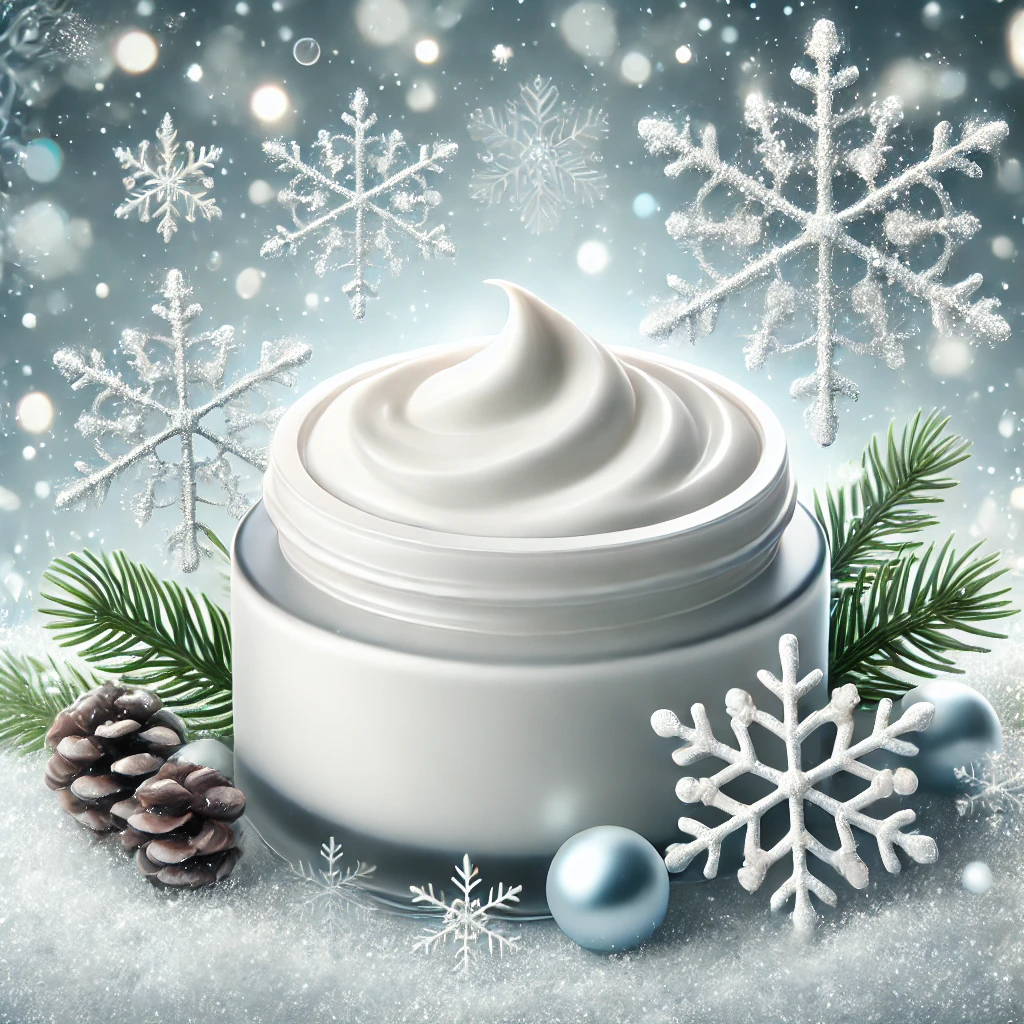
For winter, look for moisturizers with these key ingredients:
- Hyaluronic Acid: Draws water into the skin and keeps it there.
- Glycerin: A humectant that hydrates by attracting moisture from the environment.
- Ceramides: Strengthen your skin’s natural barrier and lock in hydration.
- Shea Butter or Oils: Provide deep nourishment and protection for dry skin.
If you have very dry skin, switch to a richer, cream-based moisturizer. For oily or combination skin, opt for a lightweight gel or lotion that won’t clog pores. And don’t forget your body! Use a thick, nourishing body lotion or butter after every shower to keep your skin soft and hydrated all over.
Choosing the right moisturizer is like finding the perfect winter coat for your skin—it should provide comfort, protection, and warmth against the harsh elements.
5. Cleanse Without Stripping Your Skin
Cleansing is an essential step in any skincare routine, but in winter, it’s all about choosing the right cleanser. Harsh cleansers can strip your skin of its natural oils, leaving it dry and vulnerable. During the colder months, your skin needs gentle care to maintain its moisture balance.
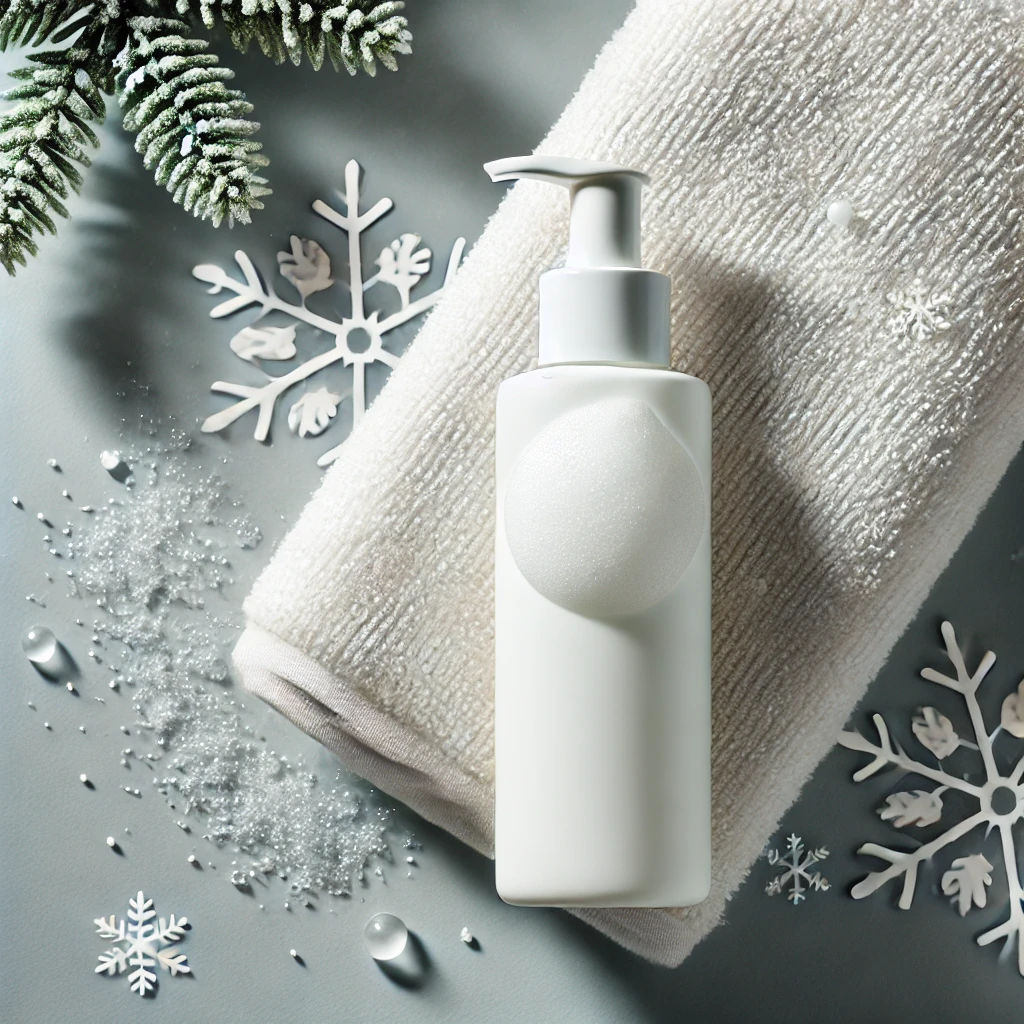
Opt for sulfate-free cleansers or cream-based options that clean your skin without drying it out. Avoid products with strong fragrances or alcohol, as these can irritate winter-sensitive skin. A great analogy is washing your favorite cashmere sweater—you wouldn’t use harsh detergents; instead, you’d choose something gentle to preserve its softness. Treat your skin the same way!
If you wear makeup, use a mild cleansing oil or balm to remove it effectively without tugging at your skin. Follow up with a gentle cleanser to ensure your skin is clean and ready to absorb moisturizing products.
6. Layering Your Skincare Products
Think of your winter skincare routine as dressing in layers for the cold. Each product in your routine plays a role in protecting and hydrating your skin. The key is applying products in the correct order so they work together effectively.
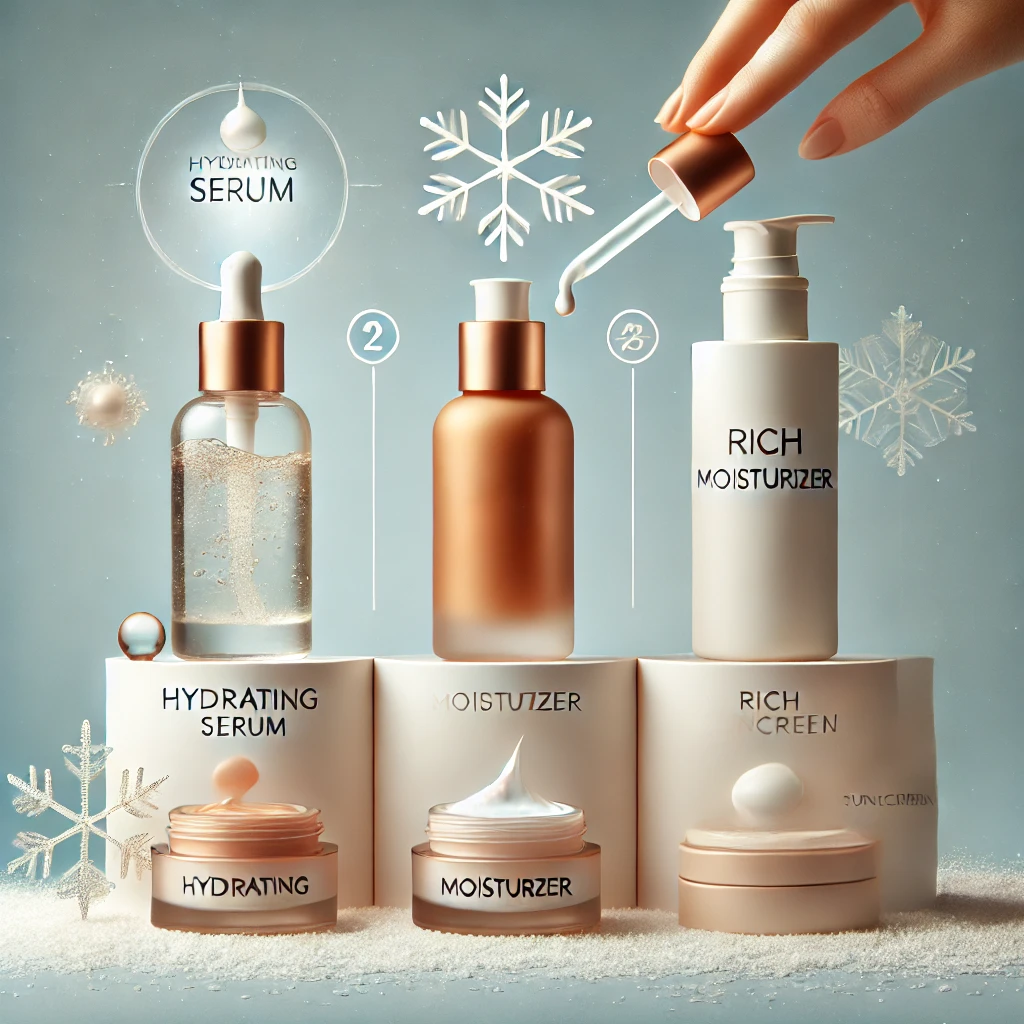
Here’s a basic layering guide for winter skincare:
- Cleanser: Start with a gentle cleanser to remove dirt and impurities.
- Toner (Optional): If you use a toner, choose one with hydrating properties rather than an astringent formula.
- Serum: Apply a hydrating serum with ingredients like hyaluronic acid or niacinamide to replenish moisture.
- Moisturizer: Lock in hydration with a rich moisturizer suitable for your skin type.
- Sunscreen: Finish with a broad-spectrum sunscreen to protect against harmful UV rays, even in winter.
The layering technique ensures that each product penetrates properly and maximizes its benefits. Allow each layer to absorb before applying the next for the best results.
7. Sunscreen: Not Just for Summer
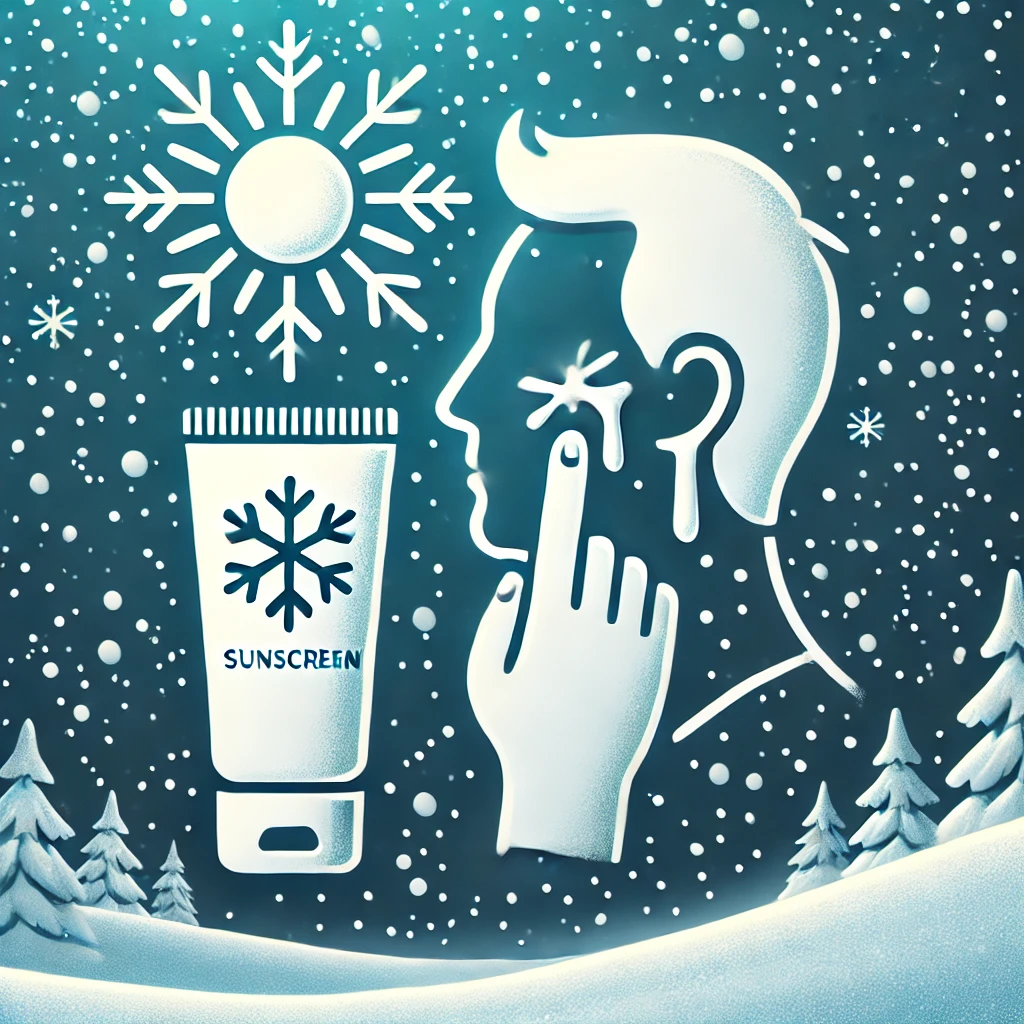
One common misconception about winter skincare is that sunscreen isn’t necessary. However, the sun’s UV rays don’t take a holiday just because it’s cold outside. In fact, UVB rays, which cause sunburn, may be weaker in winter, but UVA rays, which penetrate deeper and contribute to premature aging, remain strong year-round.
Additionally, snow can reflect up to 80% of the sun’s UV rays, increasing your exposure. Whether you’re taking a winter hike or running errands, applying sunscreen is a must. Choose a broad-spectrum sunscreen with at least SPF 30 and make it the last step in your morning skincare routine.
Think of sunscreen as your skin’s invisible shield—it protects you from damage you can’t always see, keeping your skin healthy and youthful in the long run.
8. The Role of Exfoliation
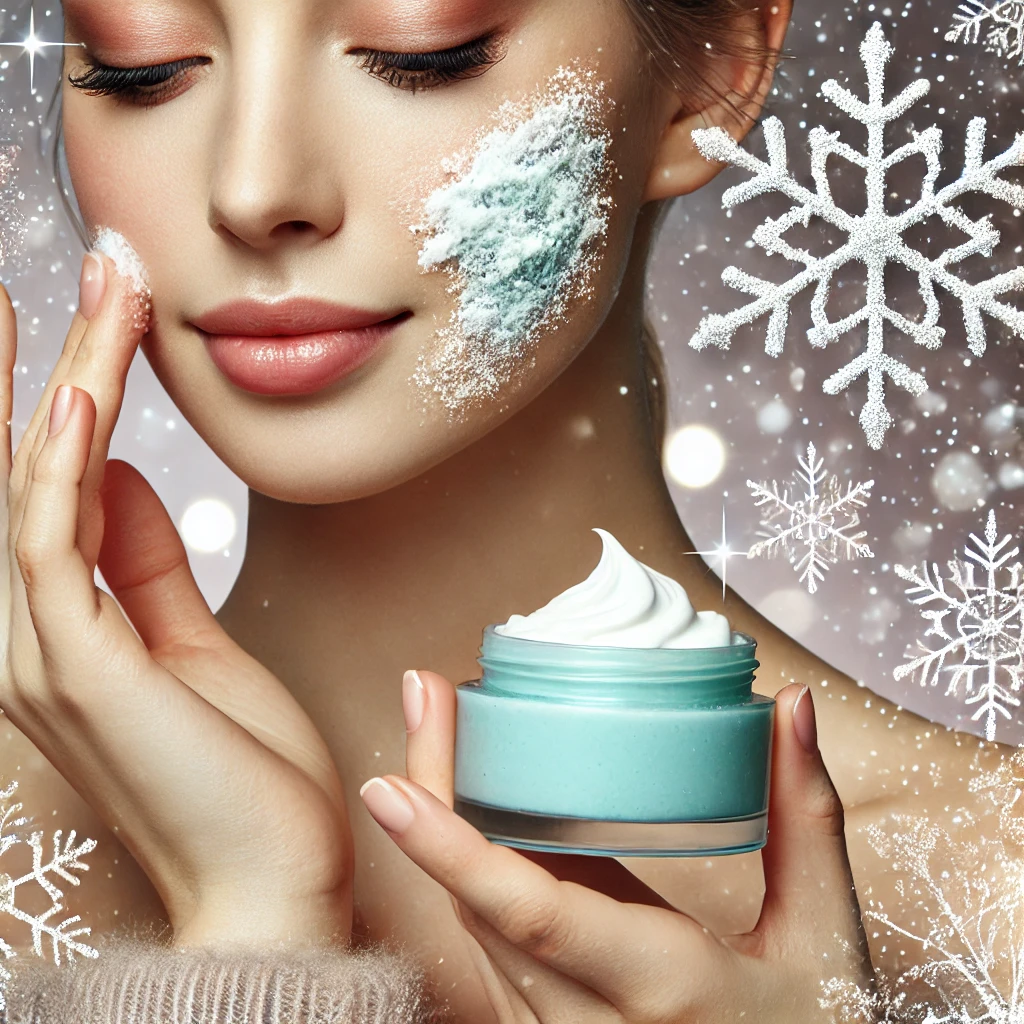
Exfoliation is like sweeping away the dead leaves in your garden to reveal the vibrant soil underneath. During winter, dead skin cells tend to build up more, leading to dull, flaky skin. Exfoliating helps remove this layer, allowing your moisturizer and other products to penetrate deeper.
However, winter is a time for gentle exfoliation. Overdoing it can damage your skin’s natural barrier, leaving it vulnerable to dryness and irritation. Use a mild exfoliator once or twice a week, depending on your skin type. Look for products with lactic acid or enzymes, as they’re effective yet gentle.
Physical scrubs with fine particles can work, but avoid anything too abrasive. Remember, your goal is to buff away dead skin, not sand it down! After exfoliating, always apply a nourishing moisturizer to soothe and hydrate your refreshed skin.
9. Protect Your Lips and Hands

Your lips and hands are often the first to show signs of winter dryness. The skin on your lips is thinner and lacks oil glands, making it highly susceptible to cracking and chapping. Similarly, frequent handwashing in cold weather can strip your hands of moisture, leaving them dry and rough.
For lips:
- Use a lip balm with SPF to protect against UV rays and prevent further drying.
- Apply a nourishing lip balm regularly, especially after eating or drinking.
- Avoid licking your lips, as saliva can worsen dryness.
For hands:
- Use a thick, non-greasy hand cream after every wash to lock in moisture.
- Wear gloves when venturing outdoors to protect your hands from cold air.
- Consider using an overnight hand mask or applying petroleum jelly before bed for intense hydration.
Think of your lips and hands as high-maintenance friends—they need a little extra care and attention, but the results are worth it. Keep them moisturized, and they’ll stay soft and healthy all winter long!
10. Nutrition and Skin Health

Your skin reflects what you eat, making nutrition a cornerstone of effective winter skincare. During colder months, it’s important to consume foods that nourish your skin from the inside out.
- Omega-3 Fatty Acids: Found in fish like salmon, walnuts, and flaxseeds, these fats help maintain your skin’s lipid barrier, reducing dryness.
- Vitamins C and E: These antioxidants combat free radicals and support skin repair. Add foods like oranges, spinach, and almonds to your diet.
- Hydrating Foods: Fruits and vegetables with high water content, such as cucumbers, celery, and watermelon, can boost your skin’s hydration.
- Healthy Fats: Avocados, olive oil, and nuts help keep your skin soft and supple.
Drinking plenty of water is just as important as eating the right foods. While you may not feel as thirsty in winter, your skin still needs hydration. Herbal teas and warm soups are excellent ways to stay hydrated and cozy.
11. Adjust Your Shower Routine
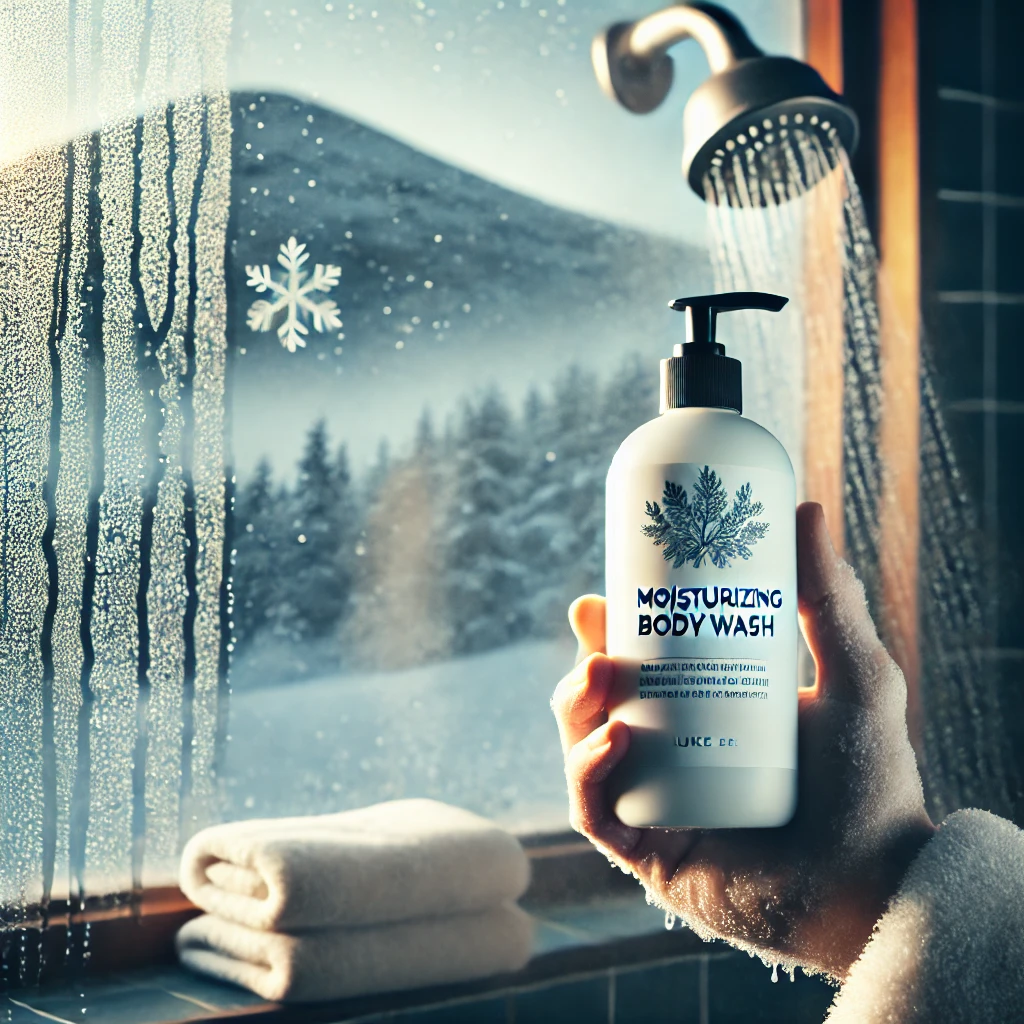
A hot shower may feel like heaven on a chilly day, but it can wreak havoc on your skin. Hot water strips your skin of its natural oils, leaving it dry and vulnerable. Instead, make small adjustments to your shower routine to protect your skin:
- Use Lukewarm Water: Opt for warm, not hot, water to maintain your skin’s natural barrier.
- Limit Shower Time: Keep your showers short—ideally 10 minutes or less.
- Choose Gentle Products: Switch to moisturizing body washes or soap-free cleansers to avoid further dryness.
- Pat Dry, Don’t Rub: Gently pat your skin dry with a soft towel to avoid irritation.
After your shower, immediately apply a body moisturizer or oil to seal in hydration. Think of it as wrapping your skin in a protective blanket before it faces the winter air.
12. Humidifiers: A Game Changer
Indoor heating may keep you warm, but it significantly lowers indoor humidity, leaving your skin parched. A humidifier can be a game changer in maintaining your skin’s moisture levels.
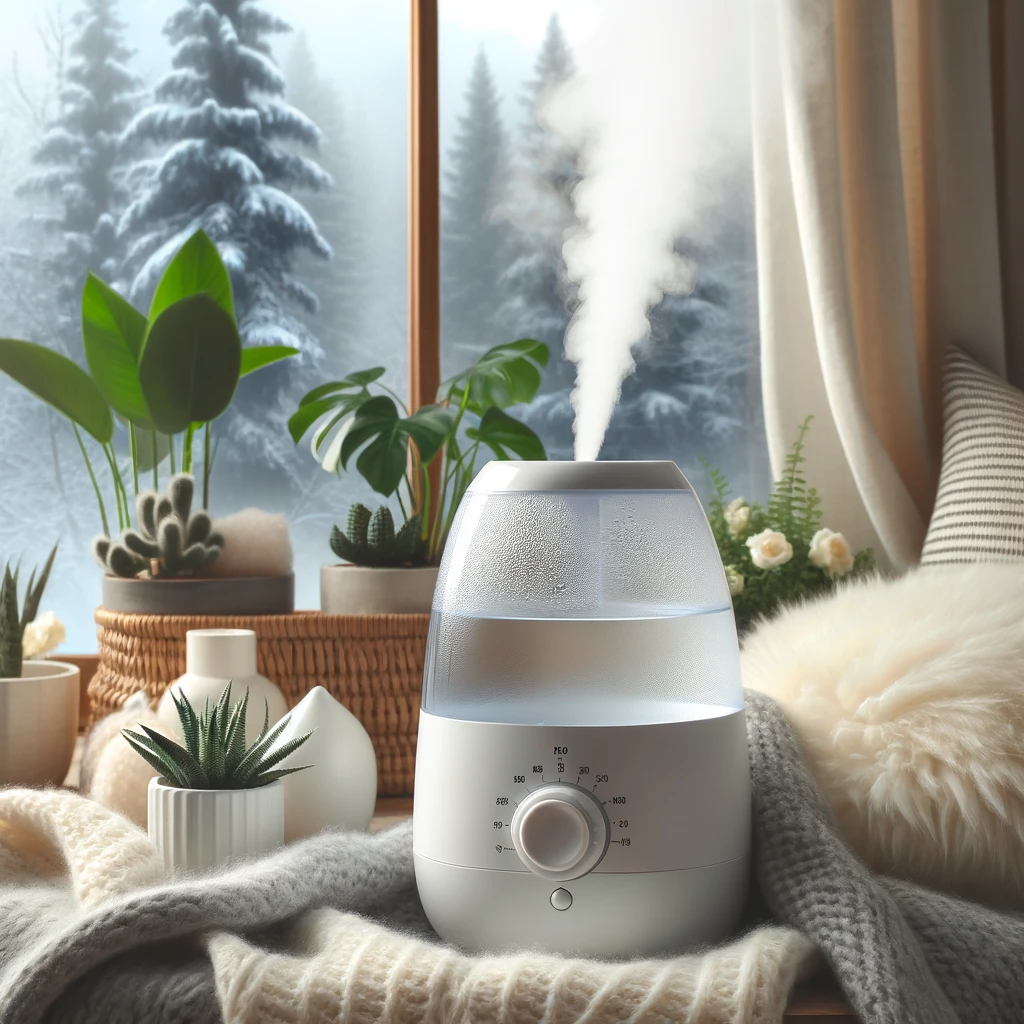
- How It Helps: A humidifier adds moisture to the air, preventing your skin from drying out. This is especially beneficial overnight when your skin naturally loses water.
- Placement Matters: Place your humidifier in the rooms where you spend the most time, like your bedroom or living area.
- Maintenance Tips: Clean your humidifier regularly to prevent mold and bacteria buildup.
Using a humidifier is like creating a mini tropical escape in the middle of winter—your skin will thank you for the added moisture!
13. Avoid Harsh Skincare Ingredients
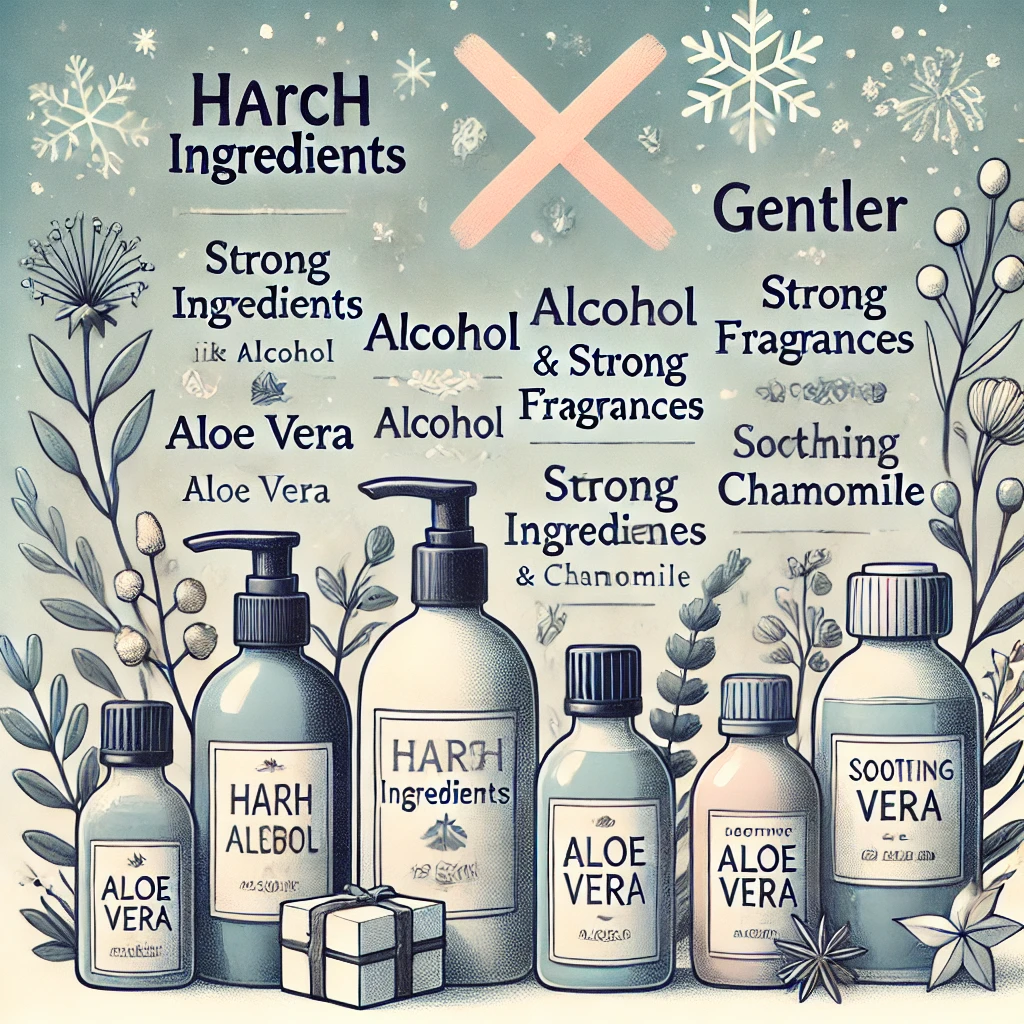
Winter is the time to simplify your skincare routine and avoid ingredients that could further irritate or dry out your skin. Some common culprits to watch out for include:
- Alcohol-Based Products: Found in toners and some cleansers, alcohol can strip your skin of its natural oils.
- Retinoids and AHAs/BHAs: While these can be beneficial, they can be too harsh for winter use. Either reduce their frequency or switch to gentler formulations.
- Fragrances and Dyes: These additives can irritate sensitive winter skin.
Instead, opt for products with soothing ingredients like aloe vera, chamomile, and colloidal oatmeal. Always patch-test new products and focus on hydrating, repairing, and protecting your skin.
14. Stay Active for Healthy Skin
Exercise might not be the first thing that comes to mind for winter skincare, but staying active plays a vital role in maintaining a healthy complexion. Physical activity improves blood circulation, delivering oxygen and nutrients to your skin while flushing out toxins.
- Boost Your Glow: Increased circulation gives your skin a natural, rosy glow, even in the dull winter months.
- Indoor Workouts: If it’s too cold to go outside, try yoga, dance, or online workout classes at home.
- Outdoor Activities: If you love being outdoors, bundle up and enjoy winter sports like skiing or a brisk walk in the fresh air.
Think of exercise as a way to warm up your skin from the inside. Pair it with a good skincare routine, and you’ll be glowing no matter how cold it gets outside.

15. Simple Home Remedies for Winter Skin

DIY remedies can work wonders. Honey masks, oatmeal scrubs, and coconut oil moisturizers are natural options to keep your skin soft and hydrated. Always patch-test before trying something new!
Conclusion
Winter skincare doesn’t have to be complicated. By making a few simple changes to your routine and understanding your skin’s needs, you can keep dryness and irritation at bay. Remember, your skin is your body’s largest organ—show it the love and care it deserves. Stay consistent, and you’ll glow all winter long!
FAQs
1. Can I skip sunscreen in winter?
No, sunscreen is essential even in winter to protect against UV rays and snow glare.
2. How often should I moisturize during winter?
You should moisturize at least twice daily—once in the morning and once before bed.
3. What’s the best way to prevent chapped lips?
Use a lip balm with SPF and reapply it throughout the day. Avoid licking your lips as it worsens dryness.
4. Are hot showers bad for winter skin?
Yes, hot showers can strip your skin of natural oils. Opt for lukewarm water instead.
5. How can I treat flaky skin during winter?
Exfoliate gently once or twice a week and follow up with a rich moisturizer to lock in hydration.







2 thoughts on “Winter Skincare Tips: How to Keep Your Skin Glowing All Season Long”